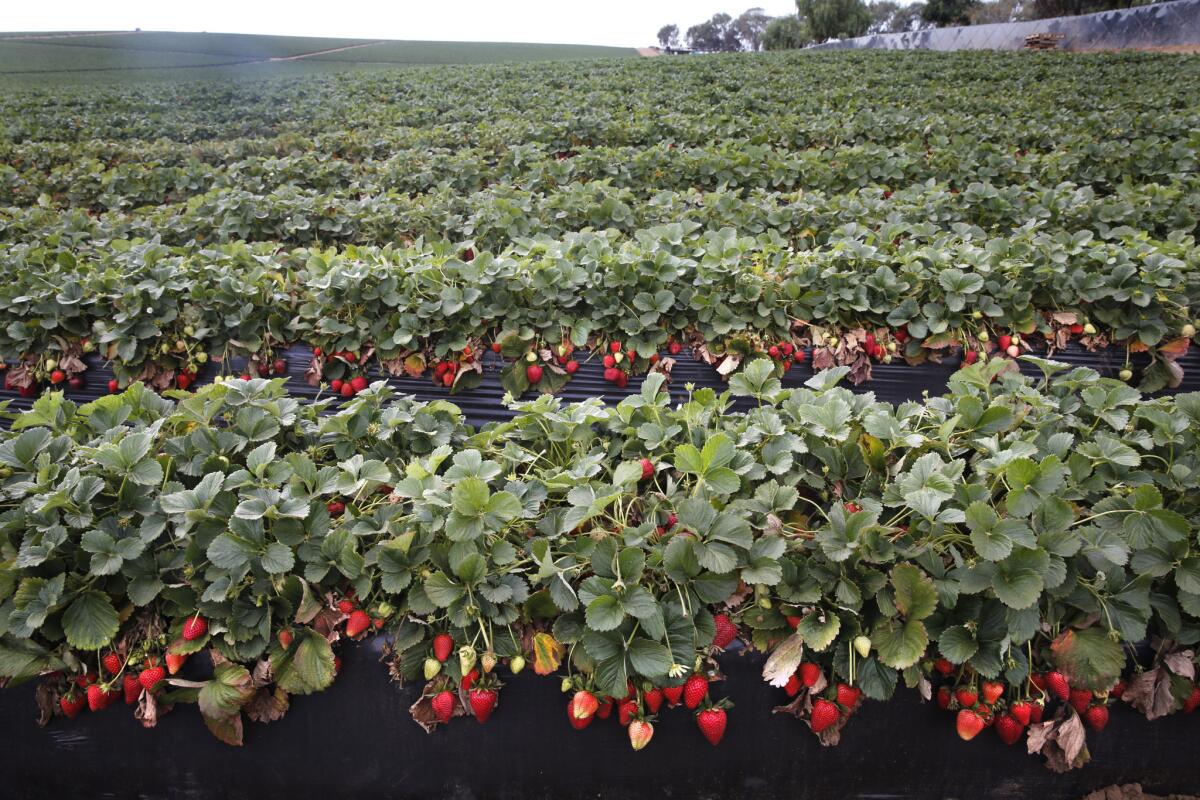Baja farmworkers’ strike crimping some produce supplies in U.S.

- Share via
Reporting from Ensenada, Mexico — Farmworkers protesting low wages at Mexican export farms in Baja California timed their strike for the peak of the harvest season, and their bold tactics appear to be having an impact.
Produce industry growers, retailers, shippers and importers on Friday reported some shortages of strawberries, zucchinis and tomatoes at stores and produce markets in Southern California and beyond. Prices remain stable, but consumers could feel the price pinch if the strike isn’t settled soon, they say.
Thousands of laborers in the San Quintin Valley 200 miles south of San Diego went on strike Tuesday, leaving the fields and greenhouses full of produce that is now on the verge of rotting. Though they stopped blocking the main highway to export markets, the road remains hard to traverse as rogue groups stop and, at times, attack truck drivers. ‘
A trucker for Del Cabo Produce reported that people threw a molotov cocktail at his truck on Thursday afternoon. He also saw the throng loot a truck for Mexican retailer Calimax.
“Our driver escaped and went into the town to hide and we called for federal police to support him,” said Juan Oliva, Del Cabo’s operations manager.
Oliva said several trucks had been delayed, causing damage to shipments of zucchinis and cherry tomatoes. Del Cabo’s farms are located in southern Baja California, but must usually go through San Quintin to reach export markets.
“It’s creating a lot of logistical problems,” Oliva said. “It’s product we need to get to the U.S. every day. We’re having to cut orders. “
Costco reported that organic strawberries are in short supply because about 80% of the production this time of year comes from Baja California. At the Los Angeles Wholesale Produce Market, importers reported shortages of tomatoes and chile peppers. Produce market stalls in Tijuana were also affected.
“It’s had a big effect,” said Moises Yeverit, owner of Chene Produce. “There’s no tomatoes, no berries. Everything is stopped up.”
Negotiations were set to re-launch Friday afternoon, and farmworker leaders expressed some optimism. They said the government had agreed late Thursday to let them break away from unions that they say favor the interests of growers over pickers.
Leaders are now moving to establish their own union specifically for farmworkers that will enable them to negotiate directly with agribusinesses. Baja California Gov. Francisco Vega de Lamadrid drew praise for showing up at the negotiations at a San Quintin restaurant on Thursday.
He pledged his support, but some laborers remained skeptical, saying that a massive strike had been necessary to focus the governor’s attention on labor issues that had been festering for years.
“It took the raised voices of thousands of laborers for you to show up … that worries us,” said Bonifacio Martinez to Vega at the meeting.
Martinez is a spokesman for the Alliance of National, State and Municipal Organizations for Social Justice, a coalition of indigenous groups.
Martinez said if negotiations broke down, laborers would consider marching en masse 250 miles to the governor’s office in Mexicali.
The clash could be an early test of a new alliance of produce industry groups dedicated to improving conditions for farmworkers in Mexico.
The International Produce Alliance to Promote a Socially Responsible Industry was established in February, after The Times documented widespread labor abuses at Mexican export farms in a series called “Product of Mexico.”
Twitter: @ricardin24
Read The Times’ investigation: Product of Mexico
More to Read
Sign up for Essential California
The most important California stories and recommendations in your inbox every morning.
You may occasionally receive promotional content from the Los Angeles Times.














